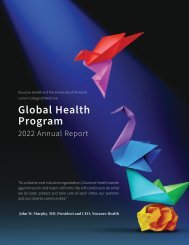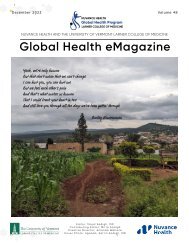eMagazine July 2023
Create successful ePaper yourself
Turn your PDF publications into a flip-book with our unique Google optimized e-Paper software.
OUR PEOPLE,<br />
OUR MISSION<br />
Global Health<br />
<strong>eMagazine</strong><br />
<strong>July</strong> <strong>2023</strong><br />
Highlights<br />
Among the Letters<br />
Reflections<br />
Hispanic and Latinx Voices<br />
Global Local<br />
Art to Remind Us of Who We<br />
Can Be<br />
Our Beautiful Planet<br />
Voices of Ugandan<br />
Students<br />
Nursing Division<br />
Congratulations<br />
Video of the Month<br />
Article of the Month<br />
Calendar<br />
Global Health Family<br />
Photo News<br />
Resources<br />
Previous Issues of<br />
the <strong>eMagazine</strong><br />
Impact on Healthcare:<br />
• Poor Nutrition and Chronic Diseases: Food deserts contribute to a<br />
higher prevalence of poor nutrition, which is associated with the<br />
development of chronic diseases. Limited access to fresh produce<br />
and whole grains increases the likelihood of consuming processed<br />
and unhealthy foods, leading to an increased risk of obesity,<br />
diabetes, cardiovascular diseases, and certain types of cancer.<br />
• Health Inequalities: Food deserts contribute to existing health<br />
inequalities, disproportionately affecting low-income individuals<br />
and communities of color. Lack of access to healthy food<br />
options widens the health gap between different socioeconomic<br />
groups, exacerbating existing disparities in health outcomes.<br />
• Limited Preventive Care: Inadequate access to nutritious food can<br />
hinder preventive healthcare efforts. A lack of nutrient-rich<br />
options in food deserts may limit individuals’ ability<br />
to maintain a healthy diet, thereby decreasing their overall<br />
health and increasing the burden on healthcare systems.<br />
• Mental Health Concerns: Food insecurity resulting from food deserts<br />
can negatively impact mental health. The stress and<br />
anxiety associated with not having reliable access to nutritious food<br />
can contribute to increased levels of depression, anxiety, and<br />
other mental health disorders. 3<br />
Addressing the Issue:<br />
• Improving Food Access: Increasing the number of grocery stores,<br />
farmers markets, and community gardens in food deserts can<br />
provide residents with more options for fresh, affordable, and<br />
nutritious food. Public-private partnerships and initiatives can<br />
help encourage investment in underserved areas while leading to<br />
more affordable prices.<br />
• Education and Outreach: Raising awareness about the importance<br />
of a healthy diet and providing education on nutrition can empower<br />
individuals to make informed choices about their dietary habits.<br />
Educational programs can be implemented in schools, community<br />
centers, and healthcare facilities.<br />
• Transportation Solutions: Addressing transportation limitations by<br />
improving public transportation or implementing mobile<br />
grocery stores can bridge the gap between food deserts and<br />
food sources, ensuring that residents have reliable access to healthy<br />
food options.<br />
• Policy Interventions: Government policies can play a crucial role<br />
in combating food deserts. Strategies such as financial incentives<br />
for grocery stores to open in underserved areas and zoning<br />
regulations that promote the establishment of fresh food outlets can<br />
help address this issue effectively. 4 Global Local continued on next page >><br />
21

















